Affiliate marketing is about more than just sharing links - it involves tracking metrics, setting up socials, and managing many processes. Luckily there are tools to help with that - read all about them in this guide.
Key takeaways
- Affiliate marketing tools automate repetitive tasks and track performance metrics, letting you focus on strategy and growth.
- Choose affiliate platforms based on ease of use, integrations, customer support, and pricing that matches your business needs.
- Different tools serve different purposes—publisher networks, influencer tracking, creator monetization, and AI content generation each require specialized platforms.
The cost for paid advertising is increasing, with Meta's CPM (cost per mille, aka cost per thousand) gradually increasing from $6.73 in September of 2022 to $8.30 in September of 2024.
As a result, affiliate marketing has become even more popular in the ecommerce world.
Why?
Well, for brands, they only have to pay for sales that have happened, so the risk is reduced. And for affiliates, the opportunity to make money by promoting brands’ products without having to deal with fulfillment and customer service is too attractive to ignore.
This online business model can make millions for businesses and affiliate marketers alike - but it takes more than just putting a link in your bio. The fact is, to be successful and stand out you need planning and a good affiliate marketing platform to help you optimize your work and manage all the operational processes.
In this article, we’ll talk about the importance of these platforms for affiliate marketing, why they’re a good option for you, and introduce you to some of the best affiliate marketing tools that will definitely boost your earnings in 2026.
Reading to learn more?
Keep reading and find out.
Why should you use affiliate marketing tools?
Affiliate marketing tools streamline complex processes and repetitive tasks that, otherwise, would be too time consuming to do manually - such as scheduling social media posts and tracking metrics.
Let’s take a closer look at some of the main reasons of why you should use affiliate marketing tools for your affiliate endeavors:
They provide automation and efficiency
Some tools can be used to automate specific repetitive tasks for you, like link generation, scheduling social media posts, and scheduling emails or blogposts. Affiliate marketing tools reduce your workload so you can focus your attention on other points of your business.
They make tracking easy
An affiliate marketing tool can help you monitor key metrics such as clicks, conversions rates, and link performance in real time. Some apps can help you identify top-performing affiliates, links, and content, while others can track revenue and return over investment (ROI) rates (we will dive deeper into these apps later in this article).
They keep you safe from fraud
Fake clicks, false leads, and spam traffic are real problems in affiliate marketing. A good affiliate marketing tool protects your account against all of this, ensuring traffic quality and integrity. Specially useful for affiliate marketing focused on blogging.
What to look for in affiliate marketing tool
When looking for the best affiliate marketing to use, consider key elements such as:
Ease of use
The best platforms are those that are user-friendly. Features like tracking and dashboards can be a bit complex, especially to beginners, so platforms with simple designs and clear instructions are best suited for users without advanced technical knowledge on marketing, metrics, and other operational aspects of affiliate marketing.
Integrations
Affiliate marketing is directly linked to other platforms such as blogs, ecommerce platforms, and even social media. So you need to make sure that the tool you choose works well with other platforms, especially if you plan to use tracking features to check performance and other metrics.
Strong support
No matter how intuitive a tool is, issues are inevitable. Platforms with strong customer support are essential to avoid any problem that could disrupt your work. Look for tools with 24/7 support, preferably with multiple contact channels, and that offers social proof of its quality.
Manageable pricing
Depending on the affiliate tool you choose, and the features you want to use, prices can be quite high. So keep it in mind that a good affiliate platform should offer value that matches its cost.
Some tools may have subscription plans offering different features based on the price, while others only require monthly payouts with all included. So make sure the pricing aligns with the needs of your business at the moment.
16 affiliate marketing tools to help you make more money online
Here are some of the best affiliate marketing tools that cater to various functionalities and categories within affiliate marketing.
Best for publishers: CJ, ShareASale, Impact
1. CJ (Commission Junction)

CJ Affiliate is a platform that connects publishers with premium advertisers, ensuring high-quality partnerships. The platform is user friendly and it’s known for its detailed performance metrics, including click-through rates (CTR), conversion data, and commission reports. You also have access to real-time tracking features to analyze the performance of your campaigns, content, and affiliate links.
Pros of CJ Affiliate:
- Access to premium advertisers and diverse industries.
- Advanced real-time tracking and reporting tools.
Cons of CJ Affiliate:
- There’s an approval process for publishers that can be strict.
- Interfaces may feel complex for beginners.
2. ShareASale

ShareASale makes it easy to find affiliate partners that align with your audience, no matter if you’re just starting or already have a solid base in affiliate marketing. It has a robust but intuitive interface with many features designed to foster growth to a broader spectrum of publishers.
Despite that, ShareASale lacks support for advanced tracking features, especially compared to other platforms like CJ Affiliate and impact.
Pros of ShareASale:
- Large network with thousands of merchants across niches.
- Intuitive dashboard with detailed reporting.
- Competitive commission rates and easy program enrollment.
Cons of ShareASale:
- Limited support for advanced tracking features.
3. Impact

This tool is designed for people who want to scale, offering dynamic features that allow customized commission rates based on performance. It's ideal for larger publishers managing multiple partnerships at once because this tool can be easily integrated into ecommerce platforms like Shopify and CRM platforms. Considering this, it may require a more advanced technical knowledge for use, not being too intuitive for newcomers.
Pros of impact:
- Advanced tracking system.
- Customizable commissioning structures.
- Seamless integrations with ecommerce and CRM platforms.
Cons of impact:
- It can be complex for beginners, requiring a steep learning curve for full utilization.
Best for influencer affiliate tracking and commissions: Upfluence, Aspire, Social Snowball, Grin
4. Upfluence
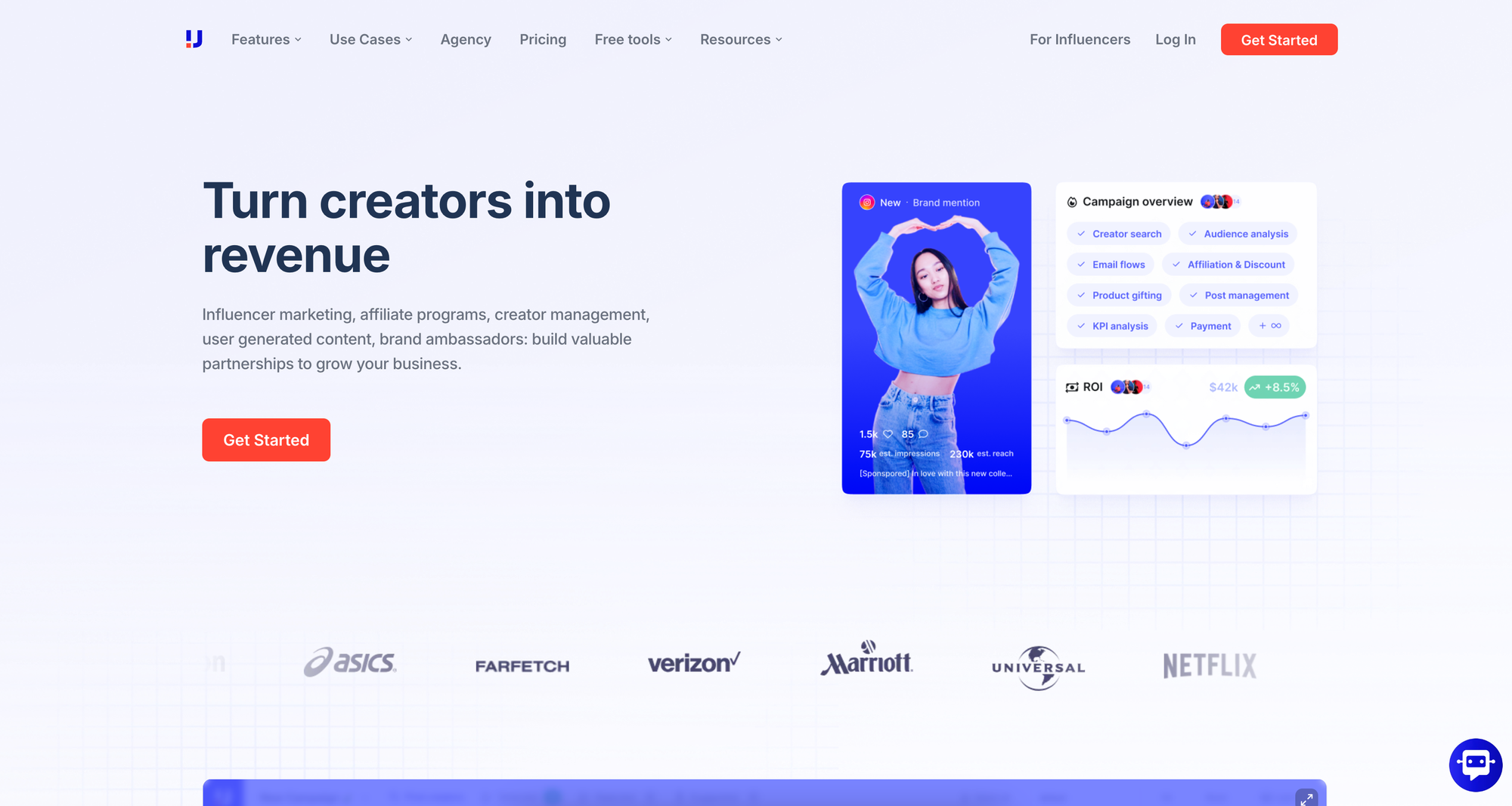
Upfluence excels in helping brands and affiliates collaborate with influencers with its ability to track affiliate commissions directly through influencer campaigns.
The tool also provides in-depth analytics on influencer performance, helping affiliates understand what drives engagement and conversions. Despite that, it offers little customization when it comes to smaller campaigns, being better suited to more experienced affiliate marketers.
Pros of Upfluence:
- In-depth analytics on influencer performance and ROI.
- Direct tracking of affiliate commissions from influencer sales.
Cons of Upfluence:
- Pricing is high (starting around $2000 per month), targeting mid-to-large-sized businesses.
- Limited customization options for smaller campaigns.
5. Aspire
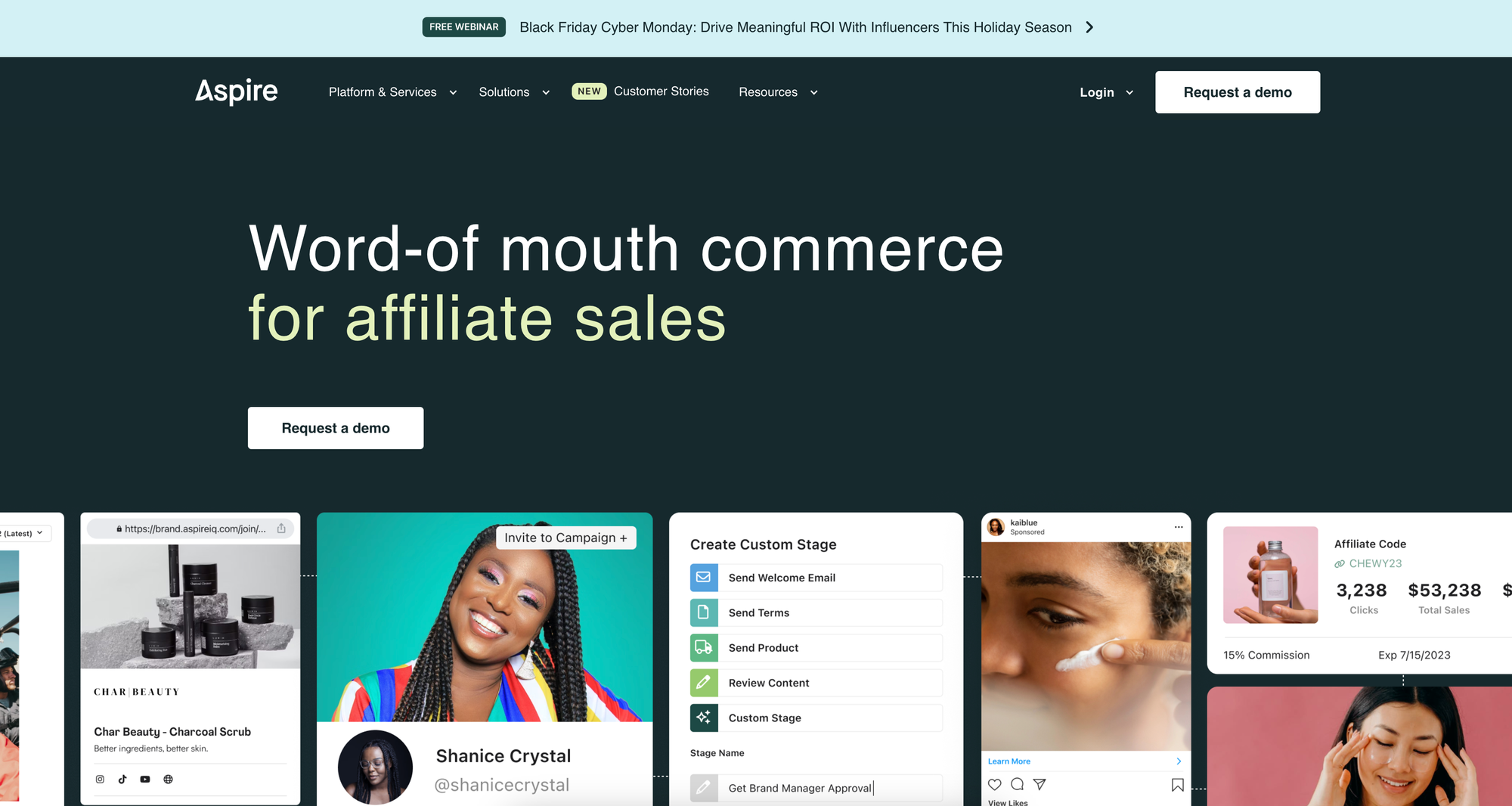
Aspire’s unique selling point is the ability to scale influencer partnerships while automating routine tasks like contract management and reporting. Its data-rich dashboard also provides insights into campaign performance, helping you fine-tune strategies and boost return over investment.
It’s important to point that Aspire is a tool focused on influencer marketing, so it may not be suited for affiliate marketing outside this segment.
Pros of Aspire:
- Centralized platform for managing multiple influencer campaigns.
- Robust reporting and performance tracking.
Cons of Aspire:
- It has limited focus outside influencer-driven campaigns.
6. Social Snowball
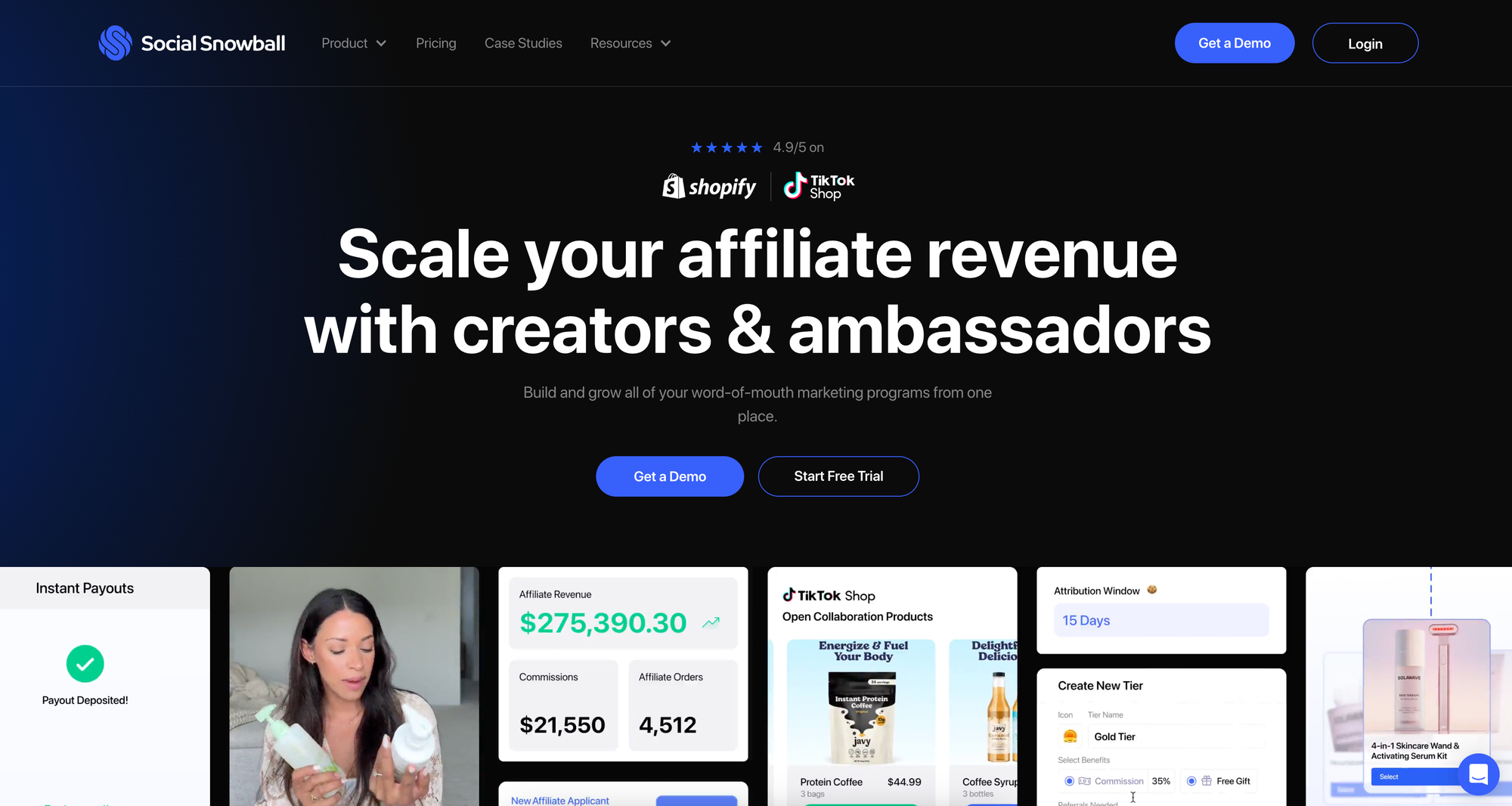
Social Snowball takes a unique approach to affiliate marketing by transforming customers and fans into affiliates by automatically generating affiliate links for them after they make a purchase, incentivizing these people to promote the respective brand and so on.
It’s basically an affiliate marketing strategy that works on growing over time like as it rolls like a “snowball” of some sorts—got it?
The platform also tracks commissions in real-time, making it easy to monitor performance. The approach of Snowball can be very beneficial for businesses with established audiences, but not quite for starting brands just starting out.
Pros of Social Snowball:
- Real-time commission tracking for transparency.
- Offers a Low-effort way to drive word-of-mouth marketing.
Cons of Social Snowball:
- It only works with Shopify stores.
7. Grin

Grin is an all-in-one influencer marketing tool with powerful affiliate tracking capabilities, allowing brands to manage influencer relationships and affiliate commissions from a single dashboard.
This affiliate platform prides itself on simplifying processes, with easy-to-read reporting, analytics, and real-time data that gives you a clear view of the performance of your influencer campaigns and other operations. Like others in this segment, Grin is an affiliate marketing tool focused on influencers, so it may not provide good support outside this area.
Pros of Grin:
- Offers seamless integration with ecommerce platforms
- Has detailed reporting on influencer-driven sales.
- Is it a centralized management hub for influencer and affiliate relationships.
Cons of Grin:
- Offers limited features for affiliate marketing not focused on influencers.
Best for making money as a creator: TikTok Shop
8. TikTok Shop
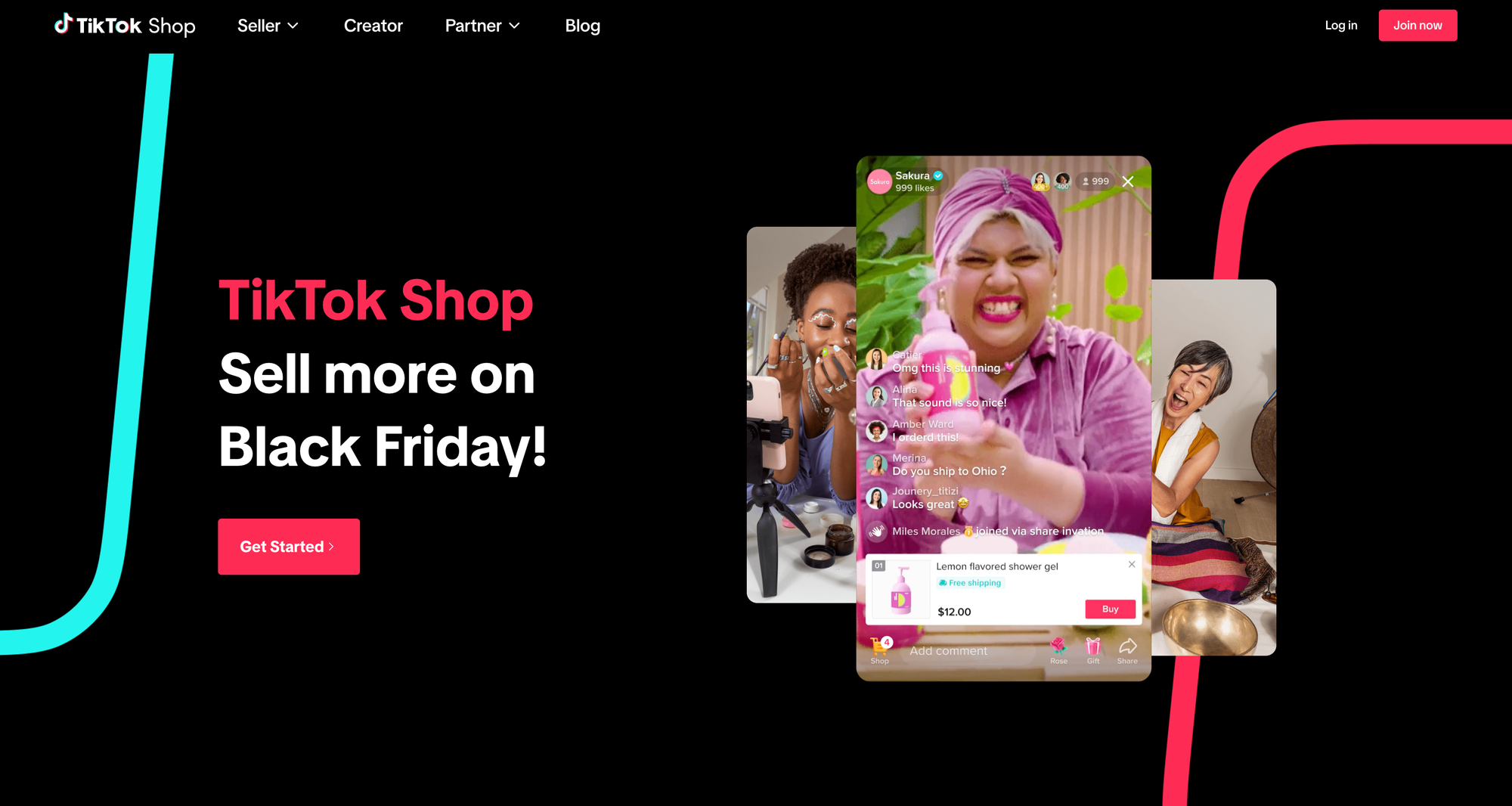
TikTok Shop is an ecommerce feature within TikTok that has revolutionized affiliate marketing by enabling creators to monetize their content directly on the platform, showcasing products in short videos and earning commissions through in-app purchases.
Being a platform for simple content, quick consumption, and fast sharing, integrated affiliate links have enormous potential for reach and monetization. As an affiliate marketing tool, TikTok is perfect for creators looking to capitalize on trending products and viral content. Brands can even partner with content creators through influencer marketing to capitalize on the viral potential of TikTok to boost earnings on a constant basis.
The success of affiliate marketing on TikTok depends on what’s trending. Earnings can be quite high if you know how to leverage trends and seasonal events, but, depending on the period, a strategy can quickly become outdated, yielding less than expected.
Pros of TikTok Shop:
- TikTok algorithm offers a huge potential for viral campaigns and better performance of affiliate links
- Affiliate links can be integrated on shorts, making it easy for access at any place, mobile or on a website.
Cons of TikTok Shop:
- TikTok’s coming and passing of trends and algorithm changes can impact reach unpredictably if you don’t plan for it.
Best for coming up with new angles and ideas for content creation: ChatGPT/AI
9. ChatGPT/AI

ChatGPT, Gemini, and other AI tools have become valuable allies in affiliate marketing. These apps allow you to generate an almost infinite amount of new ideas and angles for content creation, headlines, and even draft outlines for blog posts or social media content.
The more advanced version of ChatGPT—the paid version—even allows you to organize projects and develop specific strategies based on previous plans, with the right prompts. Basically, it becomes a real planning assistant for affiliate marketing.
Despite this, it’s important to be careful when using this type of tool. None of them are immune to errors and misinformation (they themselves inform you of this when generating content). Qualified human attention is still important, both to check for errors and to ensure that the prompts are clear and concise enough so that the content generated by these affiliate marketing tools is original and of quality.
Pros of ChatGPT and other AI tools:
- This tool generates fresh content ideas quickly and efficiently.
- They can help brainstorm headlines, outlines, and even full drafts, enhancing creativity and reducing writer’s block.
Cons of Chat GPT and other AI tools:
- It requires human editing to ensure accuracy and tone.
- Content may lack originality if over-relied upon.
- May produce "generic" or even factually incorrect content.
Best for tracking site analytics: Google Analytics
10. Google Analytics

One of—if not the—best analytics tools on the market, Google Analytics provides granular insights into user behavior, traffic sources, and conversion paths. Affiliates can use the data to identify high-performing content, optimize landing pages, and understand audience demographics, among other things.
It’s a tool known for its flexibility, and can be used by both beginners, with simpler and more limited resources, and by more experienced users, offering detailed and precise insights. It’s also free, which represents a very satisfactory advantage along with its complete features. One downside, however, is its limited integration with other platforms.
Pros of Google Analytics:
- Produce great insights into user behavior, traffic sources, and conversions.
- Have customizable reports for tracking affiliate-specific goals.
- It’s free and widely recognized as the best analytics tool.
Cons of Google Analytics:
- Requires manual setup for advanced features like goal tracking.
- Limited direct integration with affiliate networks.
Best for keyword research and content opportunities: Ahrefs and Semrush
11. Ahrefs

Ahrefs is an all-in-one marketing intelligence platform with many features for bloggers, such as website optimization, performance and mention tracking, and even built-in AI that helps with blog content improvements. The platform is known for being user-friendly, with guides for beginners and excellent customer support.
Despite the somewhat high price tag for users without many resources, Ahrefs also offers a number of free tools for website owners.
Pros of Ahrefs:
- Has many features for blog owners, ranging from performance tracking to content improvement with AI.
- Is user friendly, with detailed guides for beginners.
- Great customer support.
Con of Ahrefs:
- Prices can be high, even for basic plans, starting at $29 per month for only 100 search credits.
12. Semrush

Semrush is a platform primarily focused on search engine optimization (SEO), helping brands and individuals boost their ranking in search engines. Among its many features, the platform offers keyword research tools, which help generate traffic for websites, and on-page SEO functionalities, which support affiliates by providing ideas to improve the health and SEO performance of a website.
In addition, this affiliate marketing tool also has many features divided into categories such as SEO, content marketing, market research, advertising, and social media. Despite its advantages, Semtush can be quite expensive, even on its most basic plan. And more advanced features require a subscription, which may not be appealing to many who prefer simpler payment options.
Pros of Semrush:
- Offers deep keyword research tools.
- Provides data-driven insights on engagement and reach.
Cons of Semrush:
- Its many features requires a learning curve that takes time, specially for beginners.
- Requires a subscription to Semrush for full features.
Best for link management: Pretty Links and ThirstyAffiliates
13. Pretty Links
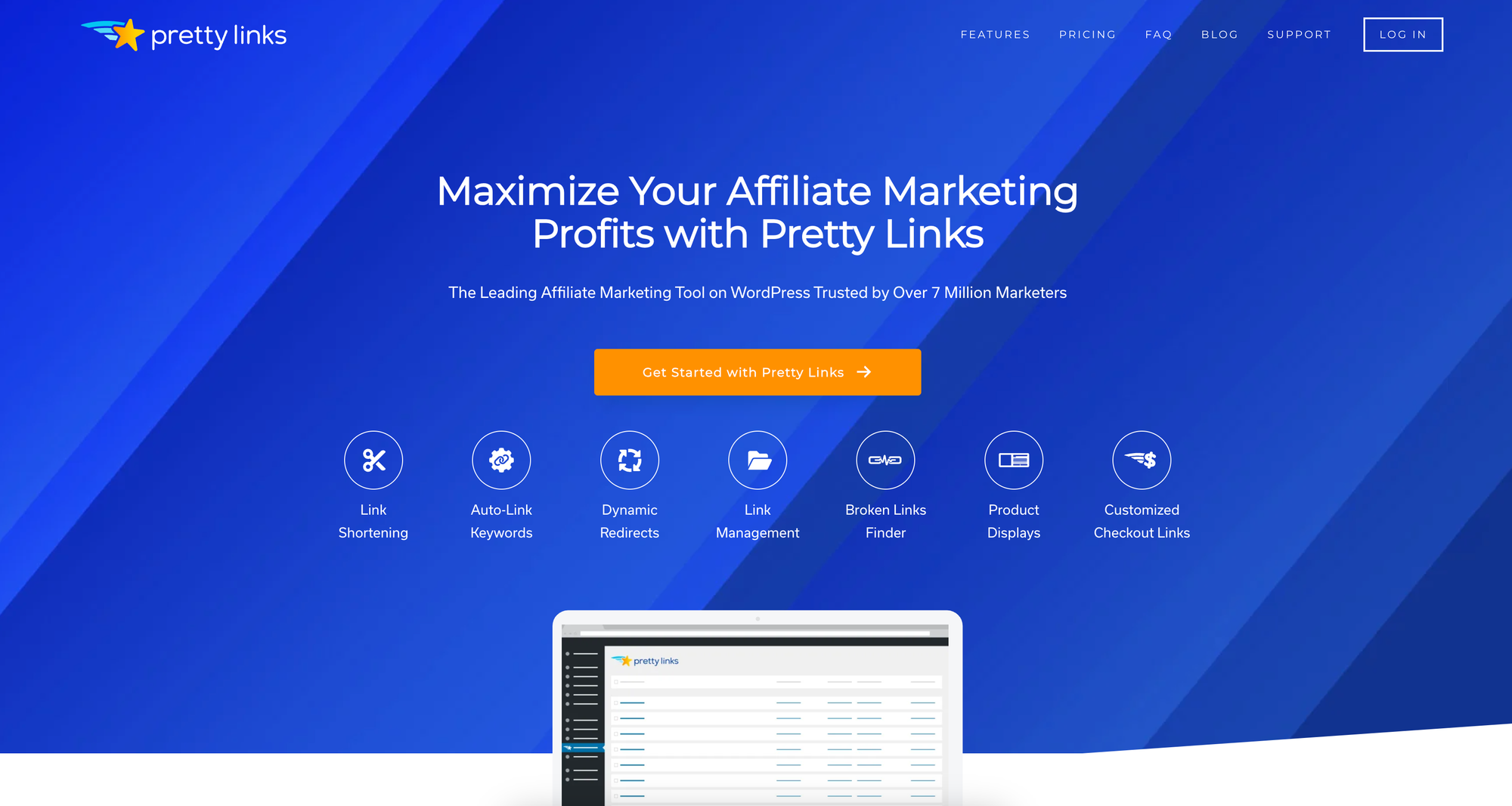
Pretty Links is all about link management for affiliate marketing. The platform allows you to generate custom checkout links, create product displays to showcase your affiliate links in the most attractive way possible, and shorten links to increase engagement and conversion rates.
Pros of Pretty Links:
- Cloaks and shortens long affiliate URLs for clean, branded links.
- Provides click tracking and analytics for link performance.
Cons of Pretty Links:
- Has limited features outside link management.
- Its analytics feature can be considered basic, compared to larger platforms.
14. ThirstyAffiliates
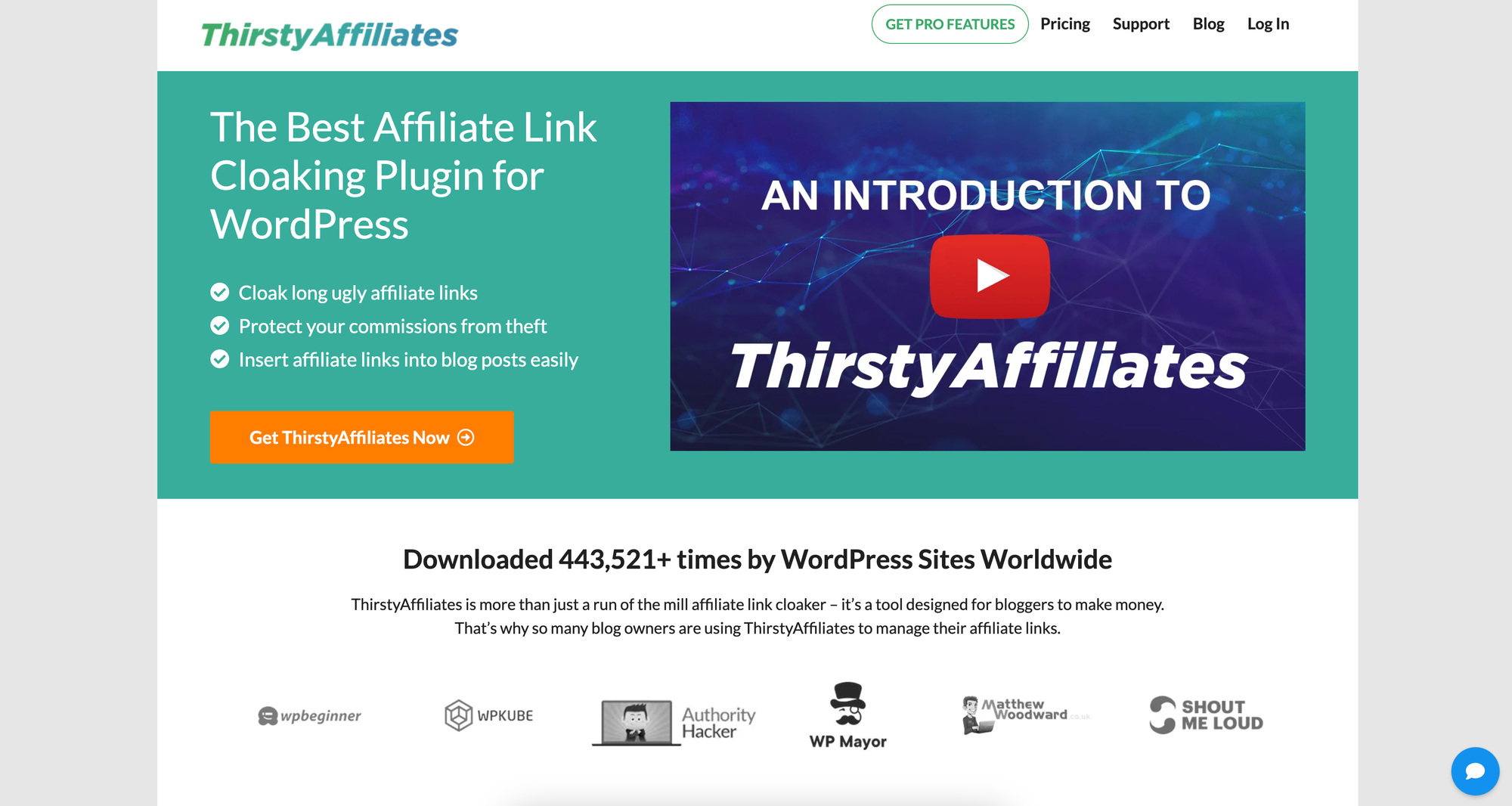
Quite similar to Pretty Links in terms of affiliate links management, what sets ThristyAffiliates apart is the fact it is made for WordPress bloggers, including automatic keyword generation for links, solid performance reports, and an efficient "proactive link fixer" system that ensures that your affiliate links are always operational and up to date.
Like we mentioned above, it’s an affiliate marketing tool for WordPress websites, so it can be considered very limited in terms of operational reach.
Pro of ThirstyAffiliates:
- Automates link updates to avoid broken or outdated links.
Con of ThirstyAffiliates:
- It’s only for WordPress blogs.
Best for social media management: Hootsuite and Buffer
15. Hootsuite

Hootsuite is a user-friendly social media management platform that focuses on automating the entire operational process of running a social media account. Whether it’s publishing and scheduling, creating AI-powered content, or analyzing engagement and reporting on the best times to post for specific audiences, Hootsuite automates all of these processes across all the major social networks.
Pros of Hootsuite:
- Offers a complete set of social media management tools, like publishing, scheduling, content creation, and performance reports.
- It’s considered an user-friendly platform, even for beginners.
Cons of Hootsuite:
- The premium plans can be expensive, with a significant price increase that may not match the number of extra features compared to the most basic plan. Hootsuite starts at $99 per month billed annually.
16. Buffer

Buffer is an affiliate marketing tool focused on creating and managing content on social media. The platform offers a customizable dashboard for generating and organizing ideas—which can be powered by AI—as well as performance analysis and content publishing tools.
Although not as complete as Hootsuite, Buffer is probably one of the most cost-effective tools on the market, with free plans, as well as plans starting at $5 per month, depending on the number of channels connected.
Pros of Buffer:
- User-friendly dashboard for organizing and generating ideas
- Cost-effective compared to other platforms
Con of Buffer:
- It doesn’t have as many features as similar platforms
Make affiliate marketing work for you with Whop
Now that you've learned about the best affiliate marketing tools, it’s time to start learning about how to really make money in this industry!
Whop is home to hundreds of ecommerce experts ready to share all their affiliate marketing secrets. Whether you want to succeed at affiliate marketing on TikTok or try out faceless affiliate marketing on Instagram, Whop's courses and communities can show you how.
And, did you know that Whop also has an affiliate marketing program? You can refer individual products (aka whops) and earn a cut whenever someone joins that Whop. Just head to the Whop Discover page and check out 'hottest affiliate offers' to choose the whops you want to refer.

You can also refer creators to make their own whops. Whenever someone joins Whop through your link, as soon as they start making money, you make money - forever. As long as that person is making money on Whop, so are you.
FAQs
The frequently asked questions about the top affiliate marketing tools to boost your earnings
Why should I use affiliate marketing tools instead of managing everything manually?
Affiliate marketing tools streamline complex processes that, otherwise, would be too time consuming to do manually, like managing social media posts, and affiliate links, allowing you to focus on other aspects of your business, improving efficiency, performance, and earnings.



